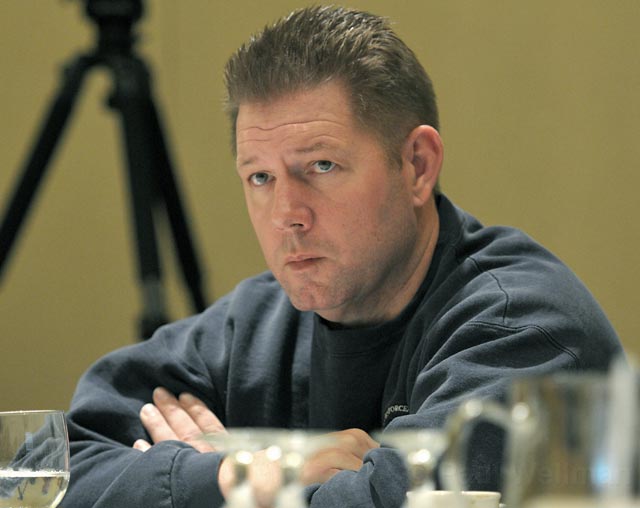
Like water polo matches, the real action at city hall takes place below the surface. This past week there was no city council meeting. Next week will be the same. But councilmembers are girding themselves for a high-stakes game of political chicken with the powerful Police Officers Association over contract negotiations.
Two weeks ago, city administrators offered what they decreed their “last, best, and final offer” — the equivalent of a 6.2-percent pay cut. This would save the city a little more than $1 million, they say, and is necessary to bridge a citywide budget gap of $9 million. Last Wednesday evening, POA members voted unanimously to reject that offer. One day later, Peter Donahue, a Bay Area economist hired by the POA to pore over city hall’s finances, informed local reporters and business leaders that Santa Barbara’s financial picture was so “robust” that city hall has no less than $116 million in unrestricted reserves.
While city administrators — and many councilmembers — have since taken vehement exception to Donahue’s conclusion, basic knowledge, and essential competence, union spokesperson Detective Jaycee Hunter took it as the ultimate validation of the union’s stubborn resistance to pay cuts at the bargaining table. “We have proven that there is simply no need for any city employee to take a pay cut,” Hunter said in a written statement. If the union were to accept city hall’s final offer, Hunter predicted, “Many officers will flee this agency in numbers never before seen.” He claimed eight officers announced they would retire in a matter of months if such cuts were enacted. Others, he said, would transfer to other departments or retire early.
The next step in what’s been a very personal head game between POA boss Sgt. Mike McGrew and City Administrator Jim Armstrong is mediation. But many councilmembers are dubious that much can come of mediation given how violently the union’s view of economic reality clashes with that of city hall. Should mediation fail, the council could vote to unilaterally impose a new contract on the POA, a move so drastic, at least by Santa Barbara standards, it hasn’t been done since the 1970s. The union responded then by going out on strike. While such strikes are now illegal, McGrew indicated the POA would instruct its members to do what their job description required and nothing more. While a majority of councilmembers have indicated a willingness to consider imposing a contract, none are eager for such a punishing and public confrontation. “I would say it’s possible,” said Mayor Helene Schneider. “It’s not a place where anyone wants to go, but it’s definitely possible.”
From the POA’s perspective, City Administrator Jim Armstrong has had it out for them since the day he started 10 years ago. In that time, the number of authorized sworn officer positions has dwindled from a high of 151 to a low of 133. Now it’s back up to 137. Likewise, the union believes that Armstrong has deliberately shrunk the city’s general fund and transferred revenues into allegedly restricted funds so that he could say there was no more money to pay the cops. Armstrong has countered by pointing out that when he started, city hall spent $17 million on police officers’ salaries and benefits; today that figure is up to $28 million. Coincidentally, that’s the amount of unrestricted funds that he concedes exists, as opposed to the $116 million contended by Donahue. But those are one-time-only funds, Armstrong insisted, and should not be used to cover such ongoing costs as salaries and benefits.
Armstrong is pushing hard to make public safety workers contribute something to their retirement accounts. Currently, firefighters and police officers pay nothing into their retirement, the only city employees not to do so. In the city’s last offer, Armstrong demanded the POA members pay 4.3 percent of their retirement costs. Thus far, the city’s biggest bargaining unit — SEIU — agreed to a 6-percent pay cut to save jobs and the firefighters are reportedly poised to do the same to keep one of the fire stations from being closed. Only the police have insisted there’s no need.



